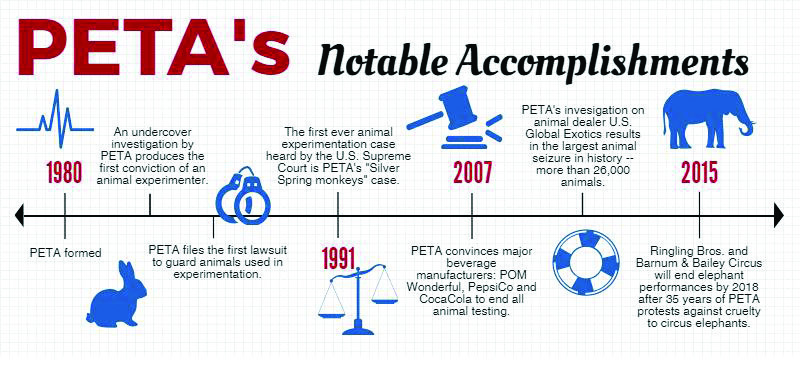PETA Gives Voice To Mistreated Animals
Behind People for the Ethical Treatment of Animals’ (PETA) promising and headstrong slogan, “animals are not ours to eat, wear, experiment on, use for entertainment or abuse in any other way,” lies hope and strength for the humane treatment of animals.
Something many people do not realize is the dangerous health hazards that they can face when eating animals. Some farmers feed or inject their livestock with growth hormones to speed up the growth process in order to make faster revenue. A recent study from the European Union’s Scientific Committee questioned whether consuming these dangerous hormones cause developmental problems with the reproductive system or even cause prostate and colon cancer. According to PETA’s website, millions of pounds of antibiotics are fed to chickens, who only metabolize 20 percent of those drugs. Their waste is then used to fertilize crops which ends up in nearby waterways. A U.S. geological study found 14 antibiotics used for chicken production in 50 percent of the waterways tested.
Because of the high demand for quantity over quality, many animals are forced to live in horrible conditions. According to AnimalVisuals.org, 95 percent of chickens are confined in tiny cages to the point where they cannot even turn around, leaving them hungry and dehydrated. It is unreasonable to resort to the inhumane treatment of animals just for profit. Why not let animals grow and mature on their own without risking their health and the health of millions of others?
Although there are many people that believe PETA is hypocritical, they do not realize all of the great achievements accomplished because of them. Because of the 2016 PETA campaign against the yearlong pesticide poisoning tests on dogs in the U.S. and Europe, PETA scientists were able to convince the Canadian government to end testing on dogs, saving hundreds of dog’s lives.
PETA has been advocating for animal rights since the 1980s, and the organization works through public education, cruelty investigations and protest campaigns. PETA has taken a stand where nobody else would, and their efforts to stop the ongoing abuse of animals has paved a way for future generations of advocates.
It is unacceptable to treat helpless animals in such an uncaring and impassionate way, but because of PETA, there is ever-growing hope for the future of animals, and their cries for help are finally being heard.




